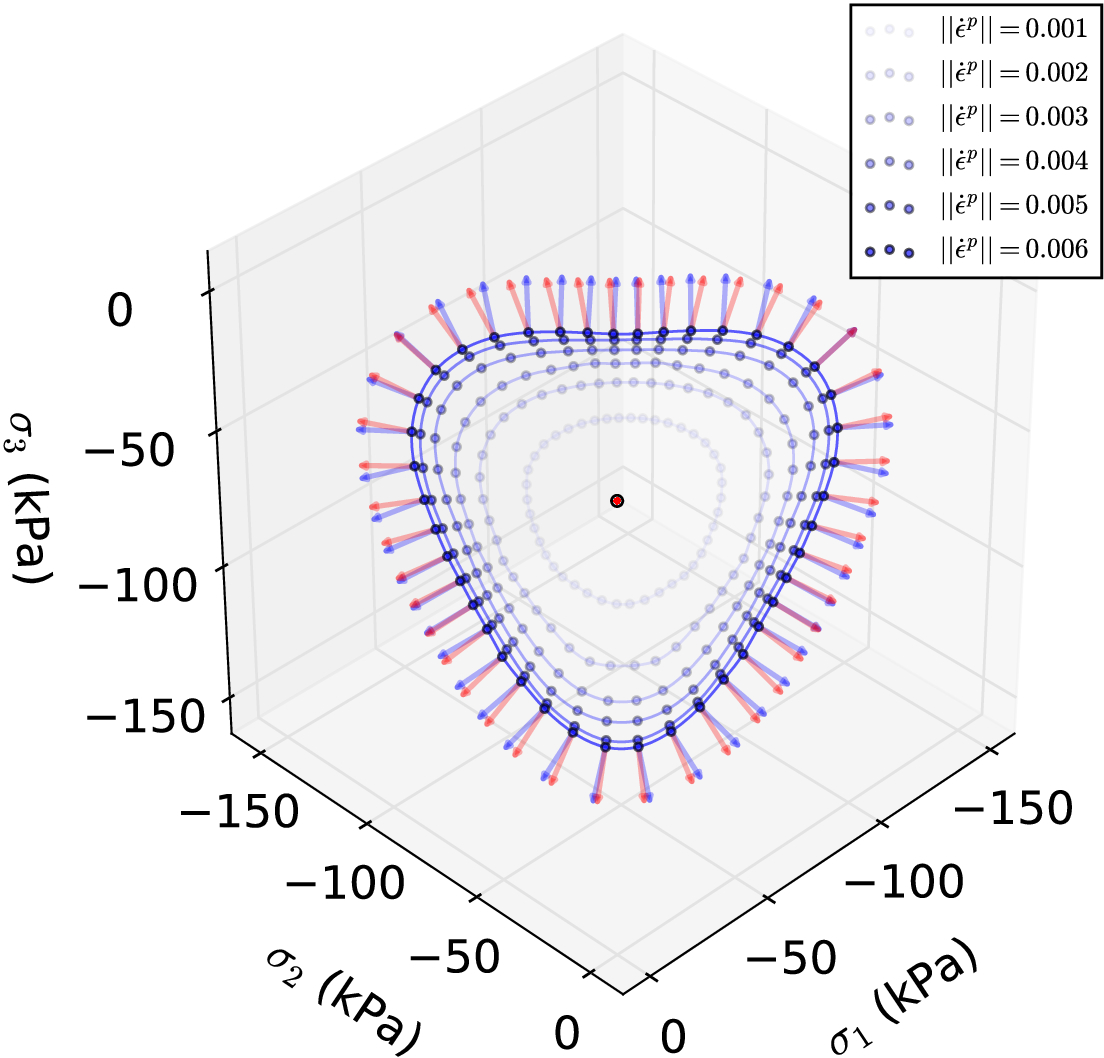Probing the Incremental Behavior of Granular Materials with In Silico Experiments
 A computational framework is presented for high-fidelity virtual (in silico) experiments on granular materials. By building on i) accurate mathematical representation of particle morphology and contact interaction, ii) full control of the initial state of the assembly, and iii) discrete element simulation of arbitrary stress paths, the proposed framework overcomes important limitations associated with conventional experiments and simulations. The framework is utilized to investigate the incremental response of sand through stress probing experiments, focusing on key aspects such as elasticity and reversibility, yielding and plastic flow, as well as hardening and fabric evolution. It is shown that reversible strain envelopes are contained within elastic envelopes during axisymmetric loading, the yield locus follows approximately the Lade-Duncan criterion, and the plastic flow rule exhibits complex nonassociativity and irregularity. Hardening processes are delineated by examining the stored plastic work and the fabric evolution in the strong and weak networks. Special attention is given to isolating in turn the effect of particle shape and interparticle friction on the macroscopic response. Interestingly, idealization of particle shape preserves qualitatively most aspects of material behavior, but proves quantitatively inadequate especially in anisotropic stress states. The results point to the importance of accurately resolving particle-scale interactions, that allows macroscopic behavior to emerge free from spurious micromechanical artifacts present in an idealized setting.
A computational framework is presented for high-fidelity virtual (in silico) experiments on granular materials. By building on i) accurate mathematical representation of particle morphology and contact interaction, ii) full control of the initial state of the assembly, and iii) discrete element simulation of arbitrary stress paths, the proposed framework overcomes important limitations associated with conventional experiments and simulations. The framework is utilized to investigate the incremental response of sand through stress probing experiments, focusing on key aspects such as elasticity and reversibility, yielding and plastic flow, as well as hardening and fabric evolution. It is shown that reversible strain envelopes are contained within elastic envelopes during axisymmetric loading, the yield locus follows approximately the Lade-Duncan criterion, and the plastic flow rule exhibits complex nonassociativity and irregularity. Hardening processes are delineated by examining the stored plastic work and the fabric evolution in the strong and weak networks. Special attention is given to isolating in turn the effect of particle shape and interparticle friction on the macroscopic response. Interestingly, idealization of particle shape preserves qualitatively most aspects of material behavior, but proves quantitatively inadequate especially in anisotropic stress states. The results point to the importance of accurately resolving particle-scale interactions, that allows macroscopic behavior to emerge free from spurious micromechanical artifacts present in an idealized setting.  A computational framework is presented for high-fidelity virtual (in silico) experiments on granular materials. By building on i) accurate mathematical representation of particle morphology and contact interaction, ii) full control of the initial state of the assembly, and iii) discrete element simulation of arbitrary stress paths, the proposed framework overcomes important limitations associated with conventional experiments and simulations. The framework is utilized to investigate the incremental response of sand through stress probing experiments, focusing on key aspects such as elasticity and reversibility, yielding and plastic flow, as well as hardening and fabric evolution. It is shown that reversible strain envelopes are contained within elastic envelopes during axisymmetric loading, the yield locus follows approximately the Lade-Duncan criterion, and the plastic flow rule exhibits complex nonassociativity and irregularity. Hardening processes are delineated by examining the stored plastic work and the fabric evolution in the strong and weak networks. Special attention is given to isolating in turn the effect of particle shape and interparticle friction on the macroscopic response. Interestingly, idealization of particle shape preserves qualitatively most aspects of material behavior, but proves quantitatively inadequate especially in anisotropic stress states. The results point to the importance of accurately resolving particle-scale interactions, that allows macroscopic behavior to emerge free from spurious micromechanical artifacts present in an idealized setting.
A computational framework is presented for high-fidelity virtual (in silico) experiments on granular materials. By building on i) accurate mathematical representation of particle morphology and contact interaction, ii) full control of the initial state of the assembly, and iii) discrete element simulation of arbitrary stress paths, the proposed framework overcomes important limitations associated with conventional experiments and simulations. The framework is utilized to investigate the incremental response of sand through stress probing experiments, focusing on key aspects such as elasticity and reversibility, yielding and plastic flow, as well as hardening and fabric evolution. It is shown that reversible strain envelopes are contained within elastic envelopes during axisymmetric loading, the yield locus follows approximately the Lade-Duncan criterion, and the plastic flow rule exhibits complex nonassociativity and irregularity. Hardening processes are delineated by examining the stored plastic work and the fabric evolution in the strong and weak networks. Special attention is given to isolating in turn the effect of particle shape and interparticle friction on the macroscopic response. Interestingly, idealization of particle shape preserves qualitatively most aspects of material behavior, but proves quantitatively inadequate especially in anisotropic stress states. The results point to the importance of accurately resolving particle-scale interactions, that allows macroscopic behavior to emerge free from spurious micromechanical artifacts present in an idealized setting. 